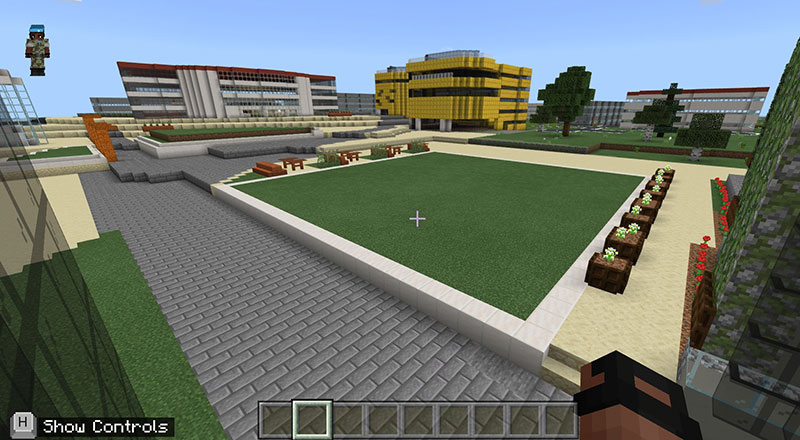Helping university students connect in a virtual world
A resourceful team from Teesside University have come together with an innovative way of helping new students to connect during the pandemic – using one of the most popular video games in the world.

Covid-19 has presented new challenges for universities this year; with social distancing measures and the majority of teaching taking place online, meaning it is not as easy for students to get to know each other and familiarise themselves with the campus.
However, a group of colleagues from the University have collaborated to help tackle these obstacles by recreating team building activities online, giving students the chance to interact with each other and work together to solve problems.
Dr Helen Carney (Senior Lecturer in Molecular Biology) and Dr Helen Tidy (Principal Lecturer for Learning and Teaching), both from the University’s School of Health & Life Sciences, worked together with PhD Student Alex Wood and Outdoor Activities Officer Callum Anderson to build a virtual Teesside University campus in the video game Minecraft.
Launched in 2009, Minecraft is the best-selling video game of all time, with 200 million copies sold and 126 million monthly active users as of 2020. In the game, players explore a blocky, procedurally-generated 3D world with infinite terrain, and may discover and extract raw materials, craft tools and items, and build structures or earthworks.
Using the virtual Teesside University campus created in Minecraft, students had to complete a challenge in a group of six, with a member of academic staff there to help them along the way. Students were tasked with building a bridge across a fictional lava pit in the middle of the Campus Heart and worked together in their groups to find the best solution.
Dr Tidy said: 'It was great to see the students working together and enjoying themselves during this challenge. Some students were familiar with Minecraft from their own childhood, whereas some of our mature students hadn’t used it before – however it was great fun as some of the students even got their own children involved to help.
Our hope is that this will have a positive impact and help them really feel like Teesside University students during these unprecedented times.
'Our hope is that this will have a positive impact and help them really feel like Teesside University students during these unprecedented times. The Minecraft world we have built familiarises students with our buildings and, in theory, will help them find their way when they come to campus in-person – which is especially important given the current circumstances.
'The project has shown how we can use technology in really unusual ways to recreate the team building buzz, and address some of the challenges faced as a result of the Covid-19 pandemic.'
Students who took part in the Minecraft challenges commented that it was an enjoyable way to get to know other students on their course and to try something new.
Dr Helen Carney has also been using Minecraft to recreate field trips that had not been able to take place during the pandemic. The team are now looking at how they can build on this work to further enhance online learning and teaching as part of this year’s hybrid delivery model.
Alex Wood, a PhD student at the University, started using Minecraft as part of his studies while completing his undergraduate degree in environmental science at Teesside.
Alex explained: 'Dr Carney introduced me to Minecraft in the second year of my undergraduate degree, and from there I was intrigued by it. I went on to be a paid student researcher for Dr Carney and developed a way of teaching scorches diversity indices at Higher Education-level using Minecraft – that involved using coding features that are in built to Minecraft.
'Today, as part of my PhD, I perform 4D image analysis and 3D aquifer modelling, and my only prior coding experience is from Minecraft. Really I owe my confidence in pursuing my PhD to Dr Carney and Minecraft.'
 Teesside University hosts groundbreaking hydrogen conference
Teesside University hosts groundbreaking hydrogen conference University supporting development of new £1m concrete plant
University supporting development of new £1m concrete plant Academic’s artwork on display at Middlesbrough station
Academic’s artwork on display at Middlesbrough station